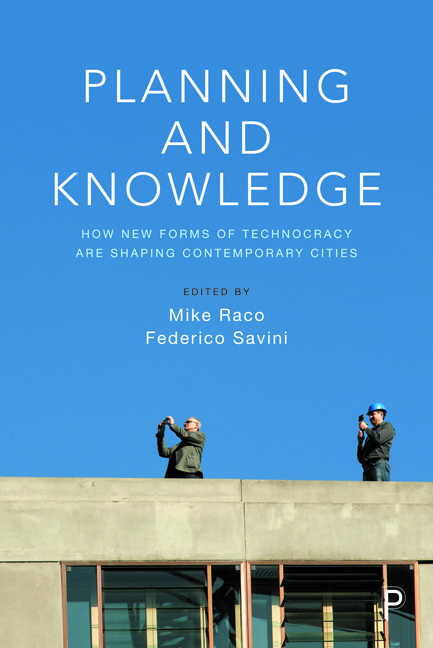Book contents
- Frontmatter
- Contents
- List of figures
- List of tables
- Notes on contributors
- Part I Conceptual framings of technocracy
- Part II Public planning and bureaucracies in contemporary urban development politics
- Part III Corporate knowledge and the land and property development sector
- Part IV Private consultants and the delivery of public policy
- Part V New constellations of actors and the management and governance of contemporary cities
- References
- Index
18 - Researching the best-practice: academic knowledgeproduction, planning and the post-politicisation ofenvironmental politics
Published online by Cambridge University Press: 30 April 2022
- Frontmatter
- Contents
- List of figures
- List of tables
- Notes on contributors
- Part I Conceptual framings of technocracy
- Part II Public planning and bureaucracies in contemporary urban development politics
- Part III Corporate knowledge and the land and property development sector
- Part IV Private consultants and the delivery of public policy
- Part V New constellations of actors and the management and governance of contemporary cities
- References
- Index
Summary
Introduction
Historically, as Patsy Healey has pointed out, ‘few ofthe ideas about planning…in the twentieth centuryinitially came out of academia’ (Healey, 2001:11485). This has significantly changed, inparticular with the rise of sustainability enteringthe urban political agenda (Béal, 2012) and the roleof cities as strategic sites to address climatechange and environmental issues (Rosol et al, 2017).Urban planning today relies on sophisticatedtechniques, models and indicators that help toidentify so-called ‘best-practices’ of urbanplanning worldwide. The strong focus onbest-practices has profoundly changed themobilisation of urban policies and the way they areimplemented. This same focus, however, also changedthe relationship between academia and urbanpolicymaking. This chapter critically approaches therole of academic knowledge, which is prone tounfounded conclusions, biased evidences andostensibly consensual solutions, but plays a crucialrole in the process of development, identificationand evaluation of these ‘best-practices’. We takethis focus in order to problematise the normativeforce that academic knowledge can have and arguethat it may contribute to the post-politicisationrather than to contest and reframe practices ofurban planning. To substantiate the arguments, wedraw on the city of Freiburg in Germany, thatdespite its severe problems and challenges relatedto social justice and social equality, is widelyhailed as a best-practice for sustainable urbandevelopment in much of the contemporary academicliterature on this issue.
Among academics and researchers from around the world,the city of Freiburg is famous for its efforts ineco-planning (the two econeighbourhoods Vauban andRieselfeld), sustainable transportation (that is,cycling and tram lines), sustainable planning, andenergy efficiency that have been implemented in thecity since the early 1980s. Freiburg's reputation ofsustainable urbanism is not only a result ofpolicies and practices, but also refers to asuccessful city marketing campaign that aims toposition Freiburg globally as a so-called ‘greencity’. The city's eco-planning strategies attractresearchers and academics from around the world, whocome to visit Freiburg in order to better understandthe city as a best-practice.
- Type
- Chapter
- Information
- Planning and KnowledgeHow New Forms of Technocracy Are Shaping Contemporary Cities, pp. 241 - 254Publisher: Bristol University PressPrint publication year: 2019



